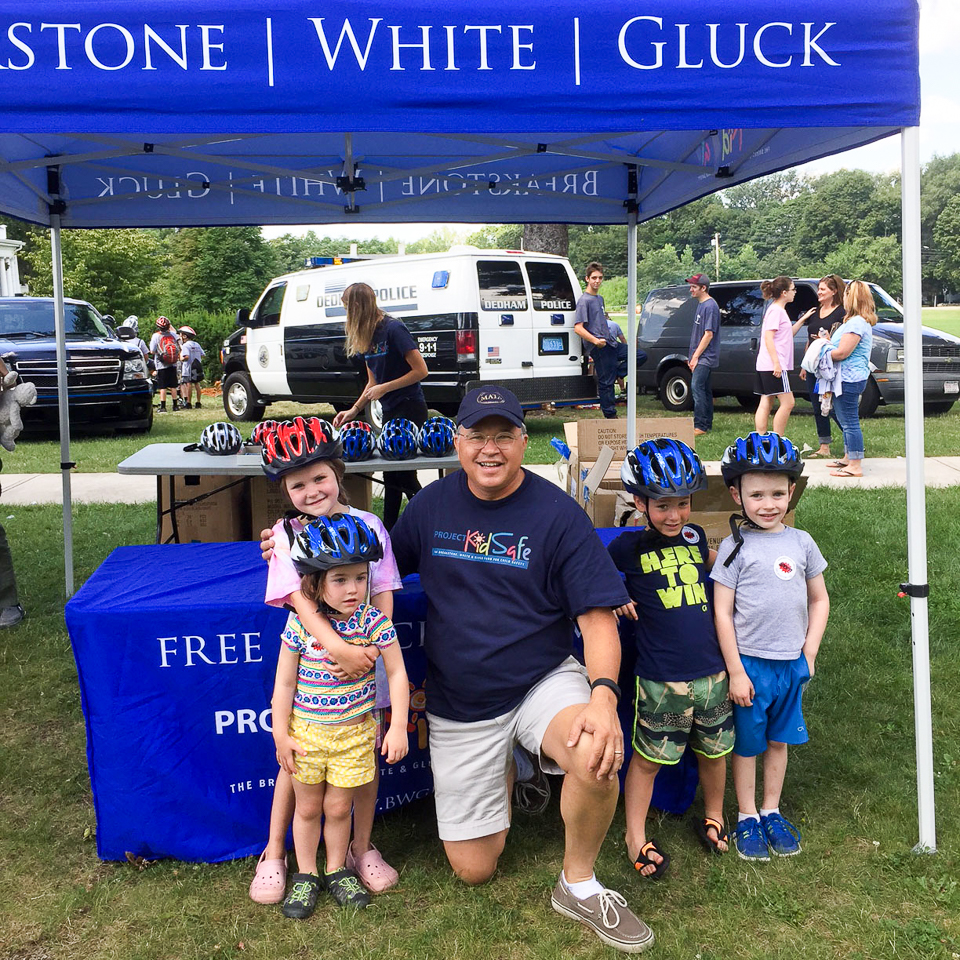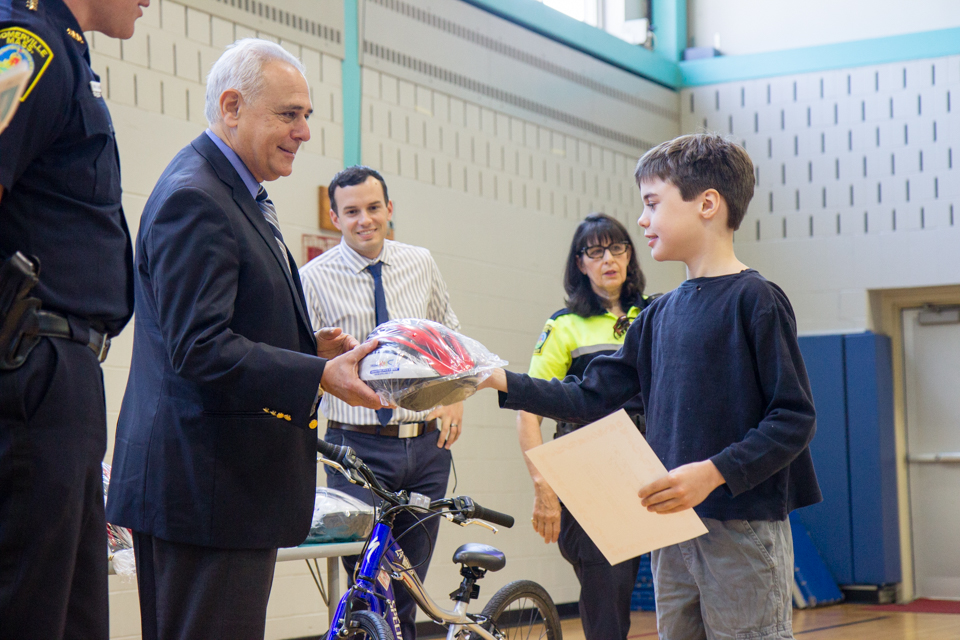Posts by Breakstone, White & Gluck
Protect Yourself From ATM Skimming

Take the right steps to protect yourself from ATM skimming. Many Massachusetts consumers have been targeted.
You insert your ATM card and out comes cash for the week. Simple, right? Next time, pay closer attention. Many Massachusetts consumers are being scammed – or skimmed – for their financial information, at a tremendous price.
ATMs – automated teller machines – are a convenient way to get cash or make deposits. Unlike banks, they are always open and accessible.
But they are vulnerable to ATM skimming, when thieves install hidden electronic skimming devices on an ATM to record a consumer’s financial information. Massachusetts has seen several recent cases.
Just this week, Cambridge Police issued an alert, seeking a man who fraudulently ran up $800 on a Cambridge woman’s ATM card. Police say he may have skimmed her financial information at an ATM in Boston. ATM skimming rarely claims just one victim, though. In June, the Lowell Sun reported on two men who pled guilty after ringing up over $100,000 on 100 credit card numbers they skimmed in the Boston area. Other stories have also been reported in Framingham, Burlington and on the South Shore
The problem is skimming devices are often small and look like part of an ATM, so consumers may not notice them, even if they are looking.
Use caution at the ATM machine. We suggest the following tips to help you protect your financial information:
- Examine the card slot before inserting your card. Look for anything loose, crooked, damaged or scratched. If you observe anything suspicious, do not swipe your card. We suggest you read this article, “How to Spot and Avoid Credit Card Skimmers,” by PC Magazine.
- Thieves also need your PIN code. They often record your information through hidden cameras. When entering your PIN, cover the keypad with your other hand to prevent your PIN from being recorded.
- Walk away from an ATM if you notice someone watching you or you sense something is wrong with the machine.
- Avoid ATM machines with minimal supervision. For instance, try not to use stand-alone ATM machines in convenience stores, bars or parking lots.
- Also beware of skimming devices when paying at gas stations.
- If an ATM does not return your card when a transaction is over, report the incident immediately to your financial institution.
- Never give out your bank account number or the PIN for your ATM card. If someone calls you and asks for your information, hang up and report the call to your local police department.
- Monitor your account for unauthorized transactions and report them to your financial institution immediately. Most banks offer online access, which allows you to check your statements easily.
- Set a daily cash withdrawal limit. Ask your bank and credit card company to notify you of transactions—these can be sent right to your cell phone.
- Check in on senior citizens in your family or neighbors. Tell them you are concerned about ATM skimming. Remind them to check their bank accounts, and also, to never give their financial information out to callers over the telephone.
- The most important step? Contact police and your bank if you suspect anything suspicious. The sooner police and your financial institution can start investigating, the better for everyone using the ATM machine.
If you do find yourself a victim, remember you have rights. Under Massachusetts law, consumers are only liable for up to $50 if they are the victim of credit card or debit card fraud. But you must report the fraud immediately to avoid any financial losses. Read this article to learn more.
Project KidSafe Bike Helmet Donations: Dedham Bike Rodeo, Mattapan on Wheels and Windsor Street Care Center in Cambridge
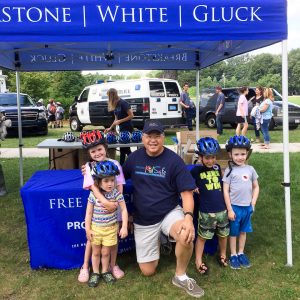 We want to share a few photos from our Project KidSafe campaign.
We want to share a few photos from our Project KidSafe campaign.
Dedham Bike Rodeo. Breakstone, White & Gluck was pleased to donate 120 Project KidSafe bike helmets to the Dedham Bike Rodeo on July 26. Attorney David W. White participated in the event, fitting helmets for children who needed one. We always enjoy this event because we get a chance to talk to children and parents about bike helmets and bike safety. It was one of the first events we donated helmets to in 2013, the year we began our Project KidSafe campaign. The rodeo is organized by the Dedham Police Department and the Dedham Parks and Recreation Department.
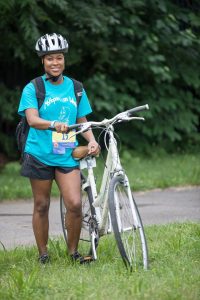
Mattapan on Wheels. Breakstone, White & Gluck also donated helmets to cyclists at the 7th Annual Mattapan on Wheels event on July 22. We are told 130 cyclists took to the Neponset Trail to raise funds for a youth bike summit and many had no helmet or needed a new one. Participants could choose their destination and ride along the trail to Pope John Paul II Park, Carson Beach or Castle Island. This was the first time we donated helmets to this event and we are told every helmet was put to use.
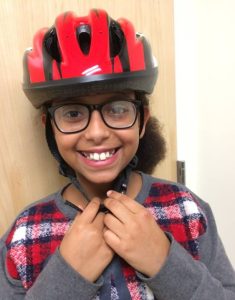
Windsor Street Care Center. Breakstone, White & Gluck also donated 150 bike helmets to the Windsor Street Care Center, which is part of the Cambridge Healthcare Alliance. The medical staff have been giving helmets away throughout the summer to children who need one. This is the third year we have made this donation.
About Breakstone, White & Gluck and our Project KidSafe Campaign
Breakstone, White & Gluck is proud to support cyclists through our Project KidSafe campaign. Since 2013, our attorneys have donated over 10,000 bicycle helmets to children in Boston and across Massachusetts. Our goal is to encourage children to wear helmets every time they ride to prevent head injuries on bicycles. To learn more about our campaign, visit www.bwglaw.com/project-kidsafe/.
Photo Credits:
- Mattapan on Wheels: Photo taken by Donrick Pond. Courtesy of Mattapan Food and Fitness Coalition Vigorous Youth Facebook page.
- Windsor Street Care Center, Cambridge Health Alliance Facebook page.
Breakstone, White & Gluck and Quincy Police Donate 100 Helmets to Fifth Graders at Bike Safety Presentation
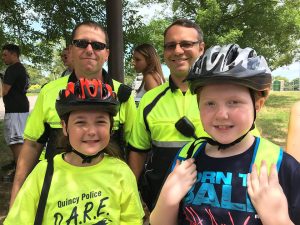
Photo Courtesy: Quincy Police Department Facebook Page. Breakstone, White & Gluck and our Project KidSafe campaign recently teamed up with Quincy Police to donate 100 bike helmets to fifth graders.
On a bike, wearing a helmet is the most important step, Quincy police officers said yesterday.
Breakstone, White & Gluck and the Quincy Police Department teamed up to give away 100 new bike helmets on Monday, during the department’s annual D.A.R.E camp at Pageant Field. But first, Lieutenant Bina and other bike safety officers shared tips for riding safely.
First, the officers said wearing a helmet saves lives and is the law for kids in Massachusetts. Officers then knocked down a big myth, that wearing a helmet does not look cool. “Oh, it’s definitely cool,” officers assured the kids. “And please share the message with your friends.” As proof, Lieutenant Bina modeled his own helmet. Everyone agreed. He looked cool.
Other tips? At red lights, cyclists must stop. But at crosswalks, officers suggested kids get off their bikes and walk across the street with pedestrians. Wearing bright colors to stand out is a must, while riding with friends is a good way to watch out for each other. And because bikes are too easily stolen, every cyclist should have a bike lock.
The officers’ final tip: always replace helmets if they crack, if you take a fall or are involved in a bike accident. Helmets must be in good condition to protect you.
Quincy Police Department is hosting roughly 100 students at its two-week DARE camp. The camp is open to students across the city, but space is limited and it fills up quickly. The camp provides students a way to learn about the police department, with visits from officers from all areas of the department, and to have a fun summer experience with other kids and police officers.
Breakstone, White & Gluck and our Project KidSafe campaign have partnered with the Quincy Police Department twice this year, donating a total of 200 helmets for city kids. In April, we donated 100 helmets for the Healthy Kids Day event at the South Shore YMCA and for officers on patrol to give to children who needed one. This week’s donation went to older kids heading to middle school this Fall.
About Project KidSafe
Since 2013, Breakstone, White & Gluck and our Project KidSafe campaign have donated over 10,000 bike helmets to protect children in Massachusetts. Our firm has represented cyclists who have been injured in bike accidents for over 25 years and we know that wearing a helmet can make all the difference for a cyclist. We are committed to protecting cyclists and preventing head injuries. Toward that goal, we have partnered with over 40 police departments, bicycle committees, community organizations and schools who are committed to keeping children safe. We are pleased to partner with Quincy Police.
About Breakstone, White & Gluck
With over 100 years combined experience, the attorneys of Breakstone, White & Gluck fight for justice for those who have been injured by negligence and wrongdoing of others. If you have been injured, contact us for a free legal consultation at 800-379-1244 or 617-723-7676 or use our contact form.
Breakstone, White & Gluck and Boston Police Team Up to Give Bike Helmets to Kids
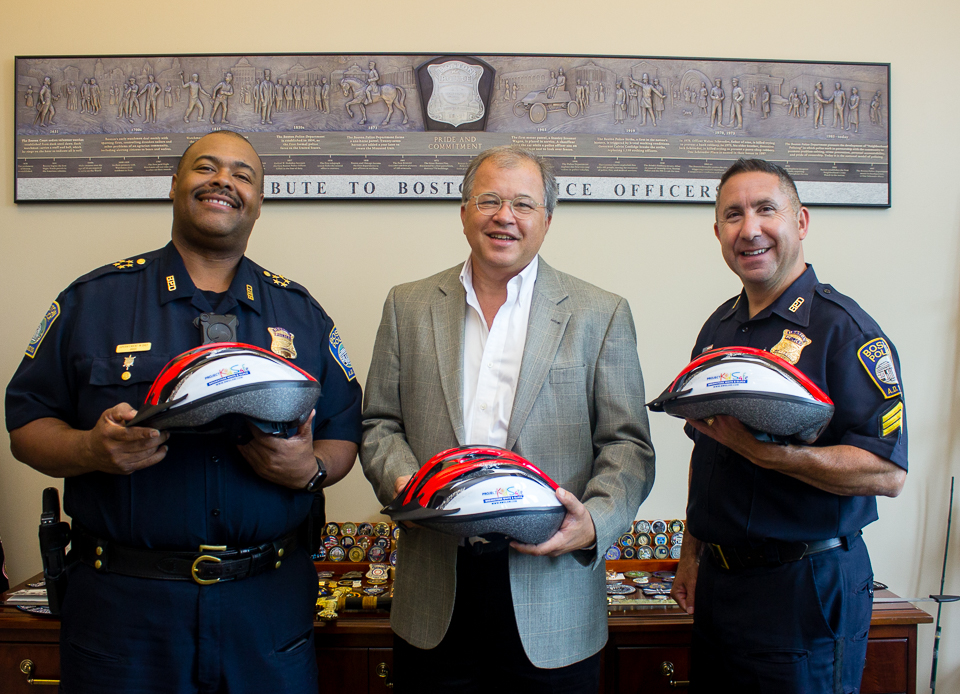
Attorney David W. White (center) with William G. Gross, Superintendent-in-Chief of the Boston Police Department (left) and Sgt. Gino Provenzano (right) of the Boston Police Department. Breakstone, White & Gluck was pleased to donate 200 bike helmets to the Boston Police Department this summer to help kids ride safely.
Breakstone, White & Gluck and our Project KidSafe campaign are proud to partner with the Boston Police Department to keep children safe on bikes.
Our attorneys recently donated 200 brand-new bicycle helmets to the Boston Police Department. Over the summer, officers will give helmets away to children who need one as part of the department’s community policing efforts. So far, officers have put new helmets on children at the Villa Victoria Bicycle Safety Day, the Dorchester/C-11 Bike Rodeo and at the Condon Community Center in South Boston. These events are meaningful because kids get more than a new helmet. They get the opportunity to learn about bike safety and meet a police officer in their own neighborhood in a fun, relaxed setting, building trust and community relationships while learning how to ride safely and protect themselves from head injuries.
Breakstone, White & Gluck thanks the Boston Police Department for helping us for a second year. Attorney David W. White shared a nice visit with Superintendent-in-Chief William G. Gross and Sgt. Gino Provenzano at Boston Police Headquarters this week. They talked about bike safety and the department’s community policing work for kids across Boston. What tremendous work they do! By the way, Boston Police have their neighborhood flashlight walks starting up again.
See photos from some of the bike helmet giveaways on the Boston Police Department website.
About Project KidSafe
Breakstone, White & Gluck is committed to protecting cyclists of all ages and preventing head injuries. Through our Project KidSafe campaign, we have donated over 10,000 bicycle helmets to children in Boston, Cambridge and other communities since 2013. We have partnered with over 40 police departments, bicycle committees, community organizations and schools who are committed to keeping children safe.
About Breakstone, White & Gluck
With over 100 years combined experience, the attorneys of Breakstone, White & Gluck fight for justice for those who have been injured by negligence and wrongdoing of others. If you have been injured, contact us for a free legal consultation at 800-379-1244 or 617-723-7676 or use our contact form.
Attorney David W. White Explains Legal Steps Ahead for Buyers After Dorchester Building Fire
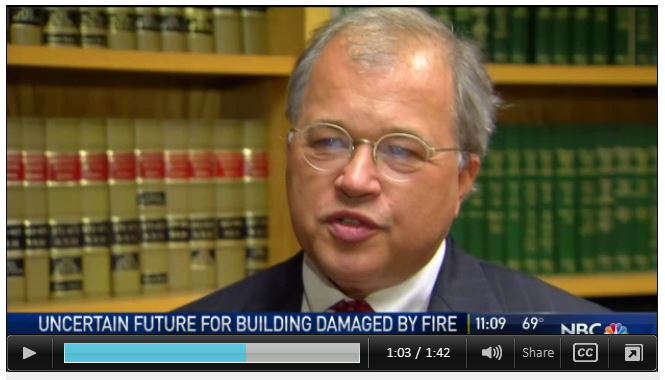
Attorney David W. White is interviewed by NBC Boston on the next steps ahead for buyers after the Dorchester building fire tragedy.
(June 29, 2017) Attorney David W. White was interviewed by NBC Boston on the potential legal options ahead for buyers of condos destroyed by a massive blaze in Dorchester. The fire went up on Wednesday, just a day before a fire inspection was reportedly scheduled.
The six-story Treadmark building had 83 units, including 32 for home ownership and 51 for affordable rentals. It was located in the Ashmont section of Boston’s Dorchester neighborhood.
News outlets report residents planned to move in as early as July and August, but are now left with hard decisions following the tragedy.
“Whenever you have a big fire like this especially when you’re so close to completion, hundreds of lives are turned inside out,” said White, a past president of the Massachusetts Bar Association.
Watch on NBC Boston’s website.
Summer Bike Safety: Breakstone, White & Gluck Donates Bicycle Helmets to Kids in Somerville, Medford and Westborough
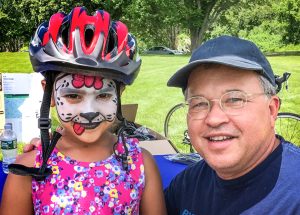
Attorney David W. White and the Westborough Bicycle and Pedestrian Advisory Commission donated bike helmets to kids at Westborough Spring Festival on June 10th. Helmets were donated by Breakstone, White & Gluck’s Project KidSafe campaign.
Summer is here and Breakstone, White & Gluck wants to remind children and families to wear your bicycle helmets.
Helmets are the most effective way to protect yourself from bicycle-related head injuries. Helmet use reduces the chance for head and brain injuries by up to 88 percent, according to the Centers for Disease Control and Prevention (CDC). Please wear your helmet every time you ride – and make sure family members do the same.
Through our Project KidSafe campaign, Breakstone, White & Gluck recently donated children’s bicycle helmets at several community events. Children had the opportunity to receive a new helmet and have it fitted by an experienced cyclist or volunteer.
Westborough Bicycle and Pedestrian Advisory Commission. Attorney David W. White joined the Westborough Bicycle and Pedestrian Advisory Commission at Spring Festival on June 10. Breakstone, White & Gluck donated nearly 200 bicycle helmets in Westborough this year, at the Westborough Spring Festival and the Healthy Kids Day at the Boroughs Family Branch of the YMCA of Central Massachusetts (which was held in April). This is the fourth year we have partnered with the Westborough Bicycle and Pedestrian Advisory Commission on these donations.
The Westborough Bicycle and Pedestrian Advisory Commission was appointed by the Board of Selectmen five years ago. Since then, the commission has actively worked to make Westborough safer for bicyclists and pedestrians. Over the past few years, they have advocated for crosswalk and rotary improvements. This year, construction began on the new Westborough multi-use path. The first phase is 1/3 mile and will connect the Westborough Shopping Center to the east side of town. Great work to the commission! This path is sure to make cycling safer in Westborough.
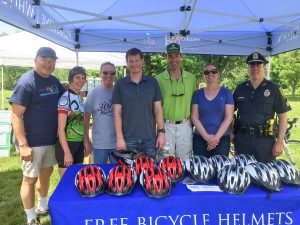

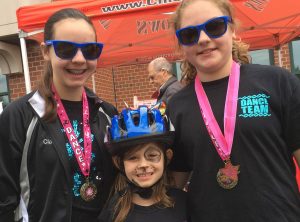
Photo courtesy of Medford Bikes, which distributed 70 bike helmets to children at Medford Day on June 4, 2017. Breakstone, White & Gluck donated the bike helmets through our Project KidSafe campaign.
Medford Day. On June 4, the Medford Bicycle Advisory Commission gave away 70 helmets to children and teens at Medford Day at Andrews Middle School. This was our first time partnering with the commission. It was a home run. Members did a great job and are enthusiastic about teaching children and parents about bike helmet use.
“A helmet is one of the most important pieces of bike safety equipment you can wear, but if it doesn’t fit right, it’s not going to do what it’s designed to do when you most need it—which is protect your head from serious injury after a crash,” said Patrick Bibbins, chair of the Medford Bicycle Advisory Commission.
Bibbins, an instructor with the League of American Cyclists, has written about bicycle safety for families. He recently published this article: “Bike Safety 101: A Guide for Parents.”
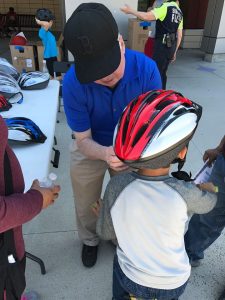
Photo courtesy of The Kiwanis Club of Somerville Facebook page. Bike Safety Day was held on June 10, 2017. Breakstone, White & Gluck was pleased to donate helmets for the kids.
Kiwanis Club of Somerville. For the past five years, Breakstone, White & Gluck has been pleased to donate bicycle helmets to the Kiwanis Club of Somerville and its annual Bike Safety Day. This is always a fun event which teaches kids fundamental bicycle safety skills in their own community.
This year’s event was held on June 10th at East Somerville Community School. Breakstone, White & Gluck donated 120 helmets for the kids. In addition to the Kiwanis Club of Somerville and Breakstone, White & Gluck, the event received donations and support from Belmont Wheelworks, Shift Community Bicycle Collective, the Greater Boston Young Professional Kiwanis, the Somerville High School Athletics and the staff at the East Somerville Community School.
For Cycling Safety: Dutch Reach Method Makes the Massachusetts Driver’s Manual
Cyclists may now ride safer near parked cars, after a recent update to the Massachusetts driver’s manual. On page 109, there is a new title, “The Danger of Open Doors to Bicyclists,” and instructions for the Dutch Reach method of exiting a car.
A common practice in the Netherlands, the Dutch Reach method calls on drivers to park and take three simple steps:
- Check your rear-view mirror.
- Check your side-view mirror.
- Open the door with your far hand, the hand farthest away from the door.
This last step forces drivers to turn their bodies, so they can see cyclists and pedestrians coming from both directions.
A Cambridge man campaigned for the change, which was announced by the Massachusetts Department of Transportation on May 30th. According to The Boston Globe, Michael Charney launched the website dutchreach.org following the death of Amanda Phillips, a 27-year-old barista at Somerville’s Diesel Café. Phillips was riding her bicycle in Inman Square in Cambridge when she struck the open door of a parked Jeep. As a result, Philips was pushed into the street and collided with a dump truck.
This is known as a dooring accident or a car-dooring crash. We have represented numerous cyclists in these accidents, which can cause very serious injuries and are more common than you may realize. According to the City of Boston, dooring accidents accounted for up to 13 percent of all bicycle crashes between 2009 and 2012.
Massachusetts is one of 40 states which have passed dooring laws, according to the League of American Cyclists. Under M.G.L. c. 90 § 14, “No person shall open a door on a motor vehicle unless it is reasonably safe to do so without interfering with the movement of other traffic, including bicyclists and pedestrians.”
Drivers can be fined $100 for each violation. But the greater penalty is drivers may have to pay compensation to injured cyclists. Read about a recent settlement we obtained for a cyclist injured in a dooring accident in Brookline.
Breakstone, White & Gluck Donates Bicycle Helmets to Every Fifth-Grader in Somerville
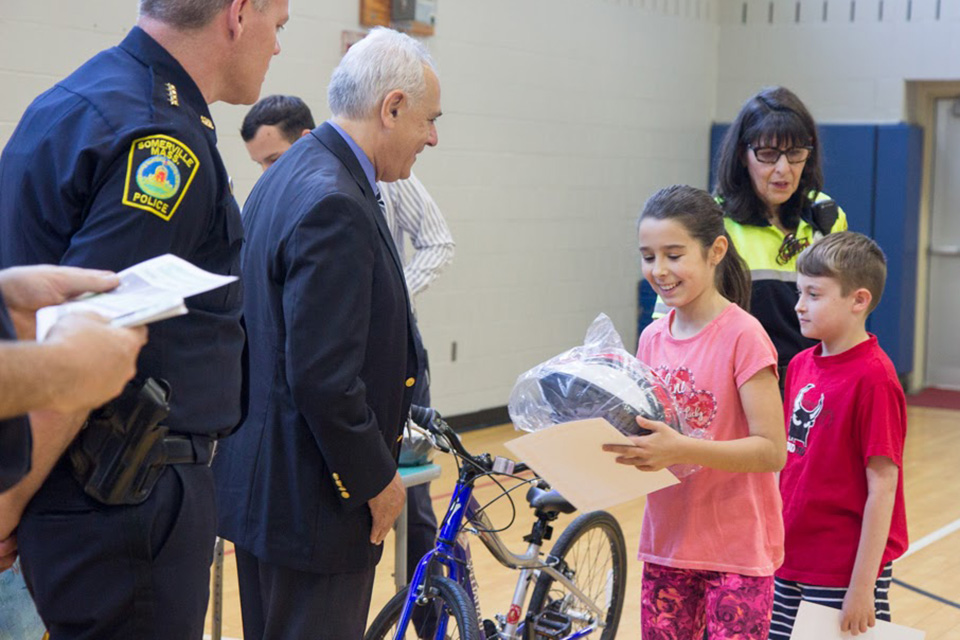
Breakstone, White & Gluck was pleased to donate 330 bicycle helmets to Somerville fifth-graders from our Project KidSafe campaign. Attorney Ronald E. Gluck is shown above, giving a young cyclist a helmet at the West Somerville Neighbhorhood School on June 15, 2017.
For the fourth year, Breakstone, White & Gluck was pleased to donate bicycle helmets to every fifth-grader in Somerville who completed the CYCLE Kids bike safety training. We donated 330 helmets from our Project KidSafe campaign this month, in partnership with the Somerville Public Schools, Somerville Police Department and CYCLE Kids.
Attorney Ronald E. Gluck was on hand today as fifth-graders at the West Somerville Neighborhood School graduated from the CYCLE Kids program and received their new bicycle helmets. Somerville Community Police Officer Marianne Manfra handed out certificates of completion while Attorney Gluck handed out the new helmets. Somerville Police Chief David Fallon, Somerville Police Captain Jim Donovan, Neil Holloway, a physical education teacher at West Somerville Neighborhood School, and Steve Simolaris, supervisor of health and physical education for the schools, helped congratulate the kids and say “Great Job.”
And from all of us here at Breakstone, White & Gluck, “Great Job Somerville Fifth-Graders.”
CYCLE Kids is a curriculum which teaches safe bike riding, helmet use and nutrition. It is taught in Somerville as part of fifth-grade physical education class. For the past four years, we have tried to encourage these lessons by giving each child who completes the CYCLE Kids program a helmet. It was worth our donation this year. At West Somerville Neighborhood School, the students learned about the importance of wearing a bicycle helmet and were even fitting their own!
To the fifth-graders of Somerville and your parents, Breakstone, White & Gluck wishes you a safe and healthy summer! Don’t forget to wear your helmet every time you ride.
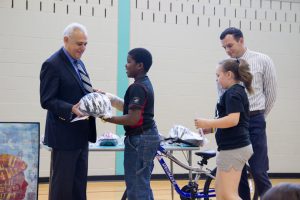
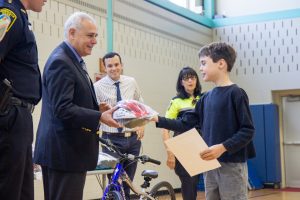
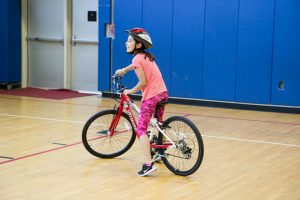
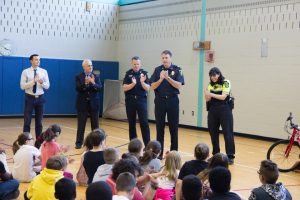
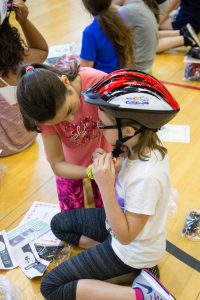
| Bicycle Helmets are the Law for Children in Massachusetts | |
|---|---|
| Helmets are required for cyclists who are 16 years of age or younger. For more information, read M.G.L. Chapter 85 Section 11B. | |
Breakstone, White & Gluck’s Support for Cycling Safety in Somerville
Breakstone, White & Gluck is active in supporting cycling safety in the Somerville community. In addition to the public schools, our law firm recently donated 120 bicycle helmets to the Kiwanis Club of Somerville for its annual Bike Safety Day, which was held last weekend. We have made this donation for the past five years and are pleased to see the Kiwanis Club continue with it each year, giving children an opportunity to receive a helmet, learn bike repair and practice safe riding in the Somerville community.
Our other partners in Somerville are Shift Bicycle Collective, a community organization which promotes bicycle safety, and Groundwork Somerville, which teaches teens agricultural skills. The teens wear the helmets as they ride around between work sites across the city of Somerville each summer.
To learn more about Project KidSafe and bike safety, visit www.bwglaw.com/project-kidsafe/. To learn more about Breakstone, White & Gluck and our work for clients, visit www.bwglaw.com.
Trading In School Days for Pool Days: Our Swimming Pool Safety Reminders for Summer
 By now, many children are ready to trade in school days for pool days. Who can blame them? Summer in New England is the best time of year.
By now, many children are ready to trade in school days for pool days. Who can blame them? Summer in New England is the best time of year.
For parents, grandparents and caregivers, the transition to summer comes with responsibilities. Talk to each other and your children about the rules for pool safety now. Make your plan for watching children and keeping them safe.
This is the most important of all planning. Drowning can occur quickly and silently, within a matter of seconds. Drowning is a leading cause of injury death for young children ages 1-14, claiming the lives of three children every day in the U.S., according to the Centers for Disease Control and Prevention (CDC). There are others who survive but are left with severe brain damage and long-term disabilities.
Make sure your family is ready for the pool:
- Pool Fence and Lock. If you have a pool of your own, there are state requirements you must meet. First, your pool fence should be at least four feet tall and be self-closing and self-latching. It must open outward. Read more tips on keeping a safe pool fence.
- Pool Alarm. Another idea is a pool alarm that notifies you about activity near your pool. A pool alarm is required for pools that are surrounded by three walls of fencing and a house serves as the fourth.
- Layers of Protection. Think how you can slow down young children heading to your pool, beyond just your pool fence. You could add an extra lock, an extra fence or shrubs.
- Never Leave a Child Unattended In or Near Water. Supervising your child in the pool is your most important job this summer. Bring your cell phone to the pool in case of emergency, but set it aside and focus solely on your child. Buy a watch you can keep with you at the pool to check the time.
- Watch for Fatigue. Make sure your child does not become tired and vulnerable to drowning or injuries. Take a few minutes of rest or leave the pool for a while.
- Swim With Your Child. For young children, keep them in your arms and just let them get exposed to the water. As they get a few years older, you can practice “touch supervision” with them, where they are never more than an arm’s length away. Put a life jacket on young children who do not know how to swim.
- Swim Lessons. Sign your kids up for swim lessons so they are familiar with the water and learn the important life-saving skills they need to protect themselves. At the same time, sign yourself up for a CPR training course.
- Baby Pools. Empty and turn over baby pools after use. If you don’t, a young child could easily climb and fall in.
- Inspect Pool Area. If you have a home pool, glance around. Is the fence in good condition? Is there any glass out (glass bottles or even glass furniture) that could break and cut someone? Also look for broken equipment, such as pool ladders. Make it a practice to walk around the entire pool area at the end of each day and remove any hazards.
- Keep Away from Pool Drains. Keep children away from all pool drains, pipes and other openings to avoid entrapments. Make sure your children are not wearing any loose jewelry, hair accessories or clothing that could get caught in a pool drain.
- Diving Boards and Slides. Diving boards and slides cause a large number of swimming pool injuries. Do not install them and consider uninstalling them to make your pool safer. If you have them, make sure you have the recommended level of water in your pool to support them. Put out traffic cones around them and tell kids they are only for certain times, such as when you have more adults at the pool.
- Friends’ Pools. If you drop your child off at a friend’s house, always ask if the family has a pool that is fenced off and look around at neighbors’ homes. Tell the parents who are supervising your child that you prefer the kids play in the sprinkler when you are not there.
Steps to a Safe Summer Driving Season
 As we approach summer, the message for Massachusetts drivers is to please slow down. Last month, in a matter of days, several car accidents seriously injured or killed pedestrians, some in crosswalks.
As we approach summer, the message for Massachusetts drivers is to please slow down. Last month, in a matter of days, several car accidents seriously injured or killed pedestrians, some in crosswalks.
On May 19, just after 7 a.m., an Acton 8th grader was struck by a van in a crosswalk at the intersection of Main Street and Hayward Road. She suffered serious injuries, leaving the scene by medical helicopter.
On May 22, a minivan crashed into two elderly women in Sandwich. The women, ages 70 and 88, went into cardiac arrest and later died at Cape Cod Hospital. At the time of impact, the women were in the crosswalk at the intersection of Route 6A and Merchants Road.
A few days later, a Watertown man was the victim, struck by a Toyota SUV at the intersection of Watertown Street and Aldrich Road. Then in Boston, the Memorial Day weekend ended with a fatal pedestrian accident on Tremont Street in the South End.
As we start summer, more people will be outside walking and everyone wants to stay safe. With a little planning, we can all drive safely this summer.
Slow Down. Under state legislation passed last year, Massachusetts cities and towns have the authority to reduce default speed limits from 30 to 25 mph. Boston, Cambridge, Medford and Quincy are among those which have dropped speeds.
Take it slow. Lower speeds give you more time to respond and prevent injuries. If there is a car crash, the impact may be less. According to the Active Transportation Alliance, if a pedestrian is struck at 40 miles per hour, the pedestrian has an 80 percent chance of dying. Reduce the speed to 20 miles per hour and there is a 10 percent chance of death.
No Distractions. Never use cell phones or electronic devices while driving. Give the road your full attention. If you are a parent, remind your teen about the dangers of distracted driving and the law. In Massachusetts, it is illegal for drivers under 18 to text or use cell phones and they could lose their driver’s license.
GPS Detours. Local police and communities are on to drivers who use GPS apps to find short-cuts. While it is perfectly acceptable to use these apps, remember that these detours typically lead to local roads. Unlike I-128 and I-93, you can expect pedestrians, cyclists, school buses and police officers who are monitoring traffic for speeding and violations. Read about stepped up patrols in the city of Quincy.
Crosswalks. Drivers should always stop for pedestrians in crosswalks and provide them with adequate time and space to safely cross the road. Drivers behind you are also required to stop.
Parking Lots. Always watch for pedestrians in parking lots. Last February, an employee at Trader Joe’s in Acton was hit by a SUV backing out of a space outside the grocery store. She died on the scene, just minutes after finishing her shift and preparing to head home for the day.
Summer Festivals. When possible, carpool or walk to concerts and summer festivals. Drivers can be impatient, increasing the likelihood of a crash.
No Driving and Driving. Don’t drink and drive. Driving and driving is against the law and you have zero ability to watch out for pedestrians if you under the influence.
Be Rested. Many drivers leave their Cape Cod or New Hampshire vacations early or late to avoid the commute. Make sure you are properly rested.
About Breakstone, White & Gluck
The Boston personal injury lawyers at Breakstone, White & Gluck have over 100 years combined experience representing those injured and killed in pedestrian accidents and car crashes in Boston, Cambridge and across Massachusetts. If you have been injured, learn your rights. For a free legal consultation, contact us at 800-379-1244 or 617-723-7676 or use our contact form.



